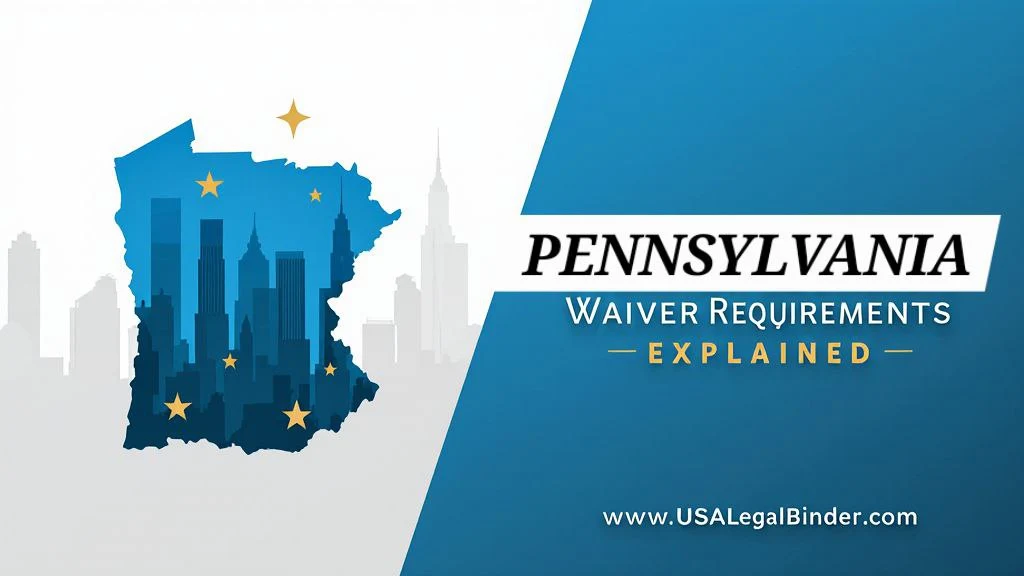Pennsylvania waiver requirements — If you need to waive court fees, request an appeal-bond exemption, or seek other fee relief in Pennsylvania, understanding the state’s waiver requirements is critical. This guide walks you through Pennsylvania-specific eligibility rules, required documents, step-by-step filing, and official resources to complete your waiver correctly.
This article focuses on Pennsylvania procedures, county clerk practices, and statewide resources so you can file with confidence and avoid common pitfalls.
Quick Overview / What this Pennsylvania Waiver covers
In Pennsylvania, a waiver generally refers to requests to proceed without payment of court fees (in forma pauperis or indigency petitions), or to seek relief from filing, transcript, or appeal bond costs when paying would cause financial hardship.
Waiver requests in Pennsylvania commonly cover:
- Waiving initial filing fees for civil, family, or probate actions because of indigence.
- Seeking waiver or reduction of appellate filing fees and bond requirements.
- Requesting fee relief for court-ordered services (e.g., transcripts, copies) when indigency is shown.
State-specific Requirements (Pennsylvania Waiver requirements)
Pennsylvania courts evaluate waiver requests under state statutes and local court rules. The Pennsylvania Unified Judicial System and county clerks administer forms and local procedures.
Key Pennsylvania agencies and resources:
Residency and jurisdiction: file the waiver in the Pennsylvania county where your case is pending. Courts consider household income, assets, public benefits, and necessary expenses when deciding whether you meet Pennsylvania’s indigency standards.
Who typically qualifies in Pennsylvania Waiver
- Individuals receiving means-tested public benefits (e.g., SNAP, Medical Assistance) are often presumed eligible.
- Low-income filers with limited assets and high essential expenses may qualify.
- Incarcerated individuals often use in forma pauperis procedures for appeals under specific rules.
Step-by-step How to Complete & Submit Pennsylvania Waiver
Follow these steps to complete a waiver filing that meets Pennsylvania requirements.
- Identify the correct form. Visit the Pennsylvania Unified Judicial System or your county clerk’s website for the county indigency or in forma pauperis form.
- Gather supporting documents. Collect pay stubs, benefit award letters (e.g., Medical Assistance), bank statements, and ID to support your claim of inability to pay.
- Complete the affidavit carefully. Provide case number, court name, household composition, income, monthly expenses, and any special circumstances that affect your finances.
- Sign under penalty of perjury. Pennsylvania forms generally require a sworn statement—follow signature instructions exactly.
- Attach proof. Include photocopies of benefit notices, pay stubs, or other documentation that corroborates your affidavit.
- File with the clerk’s office. Submit the form in person, by mail, or via the court’s e-filing system if available. Request a stamped copy as proof of filing.
- Respond to court orders. The judge may grant, deny, or call a brief hearing—provide additional materials if requested.
Typical items Pennsylvania courts require with a waiver request include:
- County indigency affidavit or Pennsylvania in forma pauperis petition (form names vary by county).
- Proof of public benefits — Medical Assistance, SNAP award letters, or Social Security statements.
- Recent pay stubs, unemployment benefits statements, or proof of lack of income.
- Bank statements or documentation of assets if requested by the court.
- Valid identification (PA driver license or ID card) and any case-related pleadings.
Many Pennsylvania counties provide a downloadable indigency form—always confirm the exact form filename and version on your county clerk’s site before filing.
Processing Time, Fees and Deadlines Pennsylvania Waiver
Filing the waiver form itself is free in Pennsylvania. Processing times depend on county workload and court level.
- Processing time: Clerks typically forward affidavits to judges within days; resolution may take from a few days to a few weeks.
- Fees: There is no fee to submit the waiver filing. If the court denies relief, you are responsible for original filing fees and related costs.
- Deadlines: File the waiver with your initial filing or prior to appeal deadlines when seeking appellate fee relief to avoid dismissal or forfeiture of rights.
Common Mistakes to Avoid Pennsylvania Waiver
- Using an outdated county form—download the current version from the official county or PACourts site.
- Failing to attach supporting proof such as benefit notices or pay stubs.
- Providing inconsistent income figures across documents or leaving required fields blank.
- Not filing in the proper county court or failing to include the case number on the form.
- Not keeping a stamped copy of the filed waiver for your records.
Use these authoritative Pennsylvania resources to find current forms and instructions:
FAQs
A: Many counties use an indigency affidavit or in forma pauperis petition. Check the PACourts site or your county clerk’s website for the exact form.
Q: Will a Pennsylvania Waiver be approved automatically?
A: No. A judge will review your affidavit and documentation and can deny the request if you have the ability to pay.
Q: Can I request a waiver of an appeal bond?
A: Yes. Appellate waiver requests follow similar indigency procedures; file before the appellate deadline to preserve rights.
Q: What happens if my waiver is denied?
A: You must pay the required fees to proceed, or you can submit additional evidence or seek legal aid for further assistance.
A: Contact your county clerk’s self-help center, Pennsylvania legal aid organizations, or law school clinics for assistance and guidance.
Conclusion & Call to Action
Meeting Pennsylvania waiver requirements means using the correct county or statewide form, providing clear documentation of financial hardship, and filing on time. Begin by checking the Pennsylvania Unified Judicial System and your county clerk’s website for the current indigency form and filing instructions.
For official forms and county contacts, visit PACourts or the PA.gov portal. For related resources, templates, or sample affidavits, see USAlegalBinder.com or consult a qualified Pennsylvania attorney for case-specific advice.
